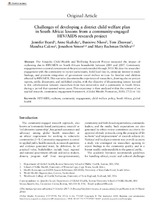| dc.contributor.author | Nkosi, Busisiwe Catherine | |
| dc.contributor.author | Beard, Jennifer J. | |
| dc.contributor.author | Skalicky, Anne M. | |
| dc.date.accessioned | 2021-01-07T11:18:22Z | |
| dc.date.available | 2021-01-07T11:18:22Z | |
| dc.date.issued | 2020 | |
| dc.identifier.citation | Nkosi, B. C. et al. (2020). Challenges of developing a district child welfare plan in South Africa: Lessons from a community-engaged HIV/AIDS research project. Global Health Promotion, 27(2), 6-16 | en_US |
| dc.identifier.issn | 1757-9767 | |
| dc.identifier.uri | 10.1177/1757975918774569 | |
| dc.identifier.uri | http://hdl.handle.net/10566/5605 | |
| dc.description.abstract | The Amajuba Child Health and Wellbeing Research Project measured the impact of orphaning due to HIV/AIDS on South African households between 2004 and 2007. Community engagement was a central component of the project and extended through 2010. We describe researcher engagement with the community to recruit participants, build local buy-in, stimulate interest in study findings, and promote integration of government social welfare services for families and children affected by HIV/AIDS. This narrative documents the experience of researchers, drawing also on project reports, public documents, and published articles, with the objective of documenting lessons learned in this collaboration between researchers from two universities and a community in South Africa during a period that spanned seven years. This experience is then analyzed within the context of an applied research, community-engagement framework. | en_US |
| dc.language.iso | en | en_US |
| dc.publisher | SAGE | en_US |
| dc.subject | Child welfare policy | en_US |
| dc.subject | Community engagement | en_US |
| dc.subject | HIV/AIDS | en_US |
| dc.subject | South Africa | en_US |
| dc.subject | Orphans | en_US |
| dc.title | Challenges of developing a district child welfare plan in South Africa: Lessons from a community-engaged HIV/AIDS research project | en_US |
| dc.type | Article | en_US |

